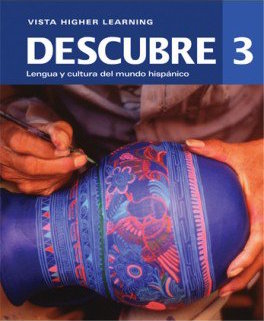
All Solutions
Page 34: Despues de leer
You could write:
*En este poema, habla Pablo Neruda, o su narrador.*
In this poem, Pablo Neruda is speaking, or his narrator.
You could write:
*Está hablando de su ex amante.*
He is talking about his ex lover.
You could write:
*El tema del poema es desamor y olvido.*
The theme of the poem is heartbreak and forgetting.
You could write:
*Es de noche, el poeta lo describe en los primeros versos.*
It’s nighttime, the poet describes it in the first verses.
You could write:
*No, el poeta no está enamorado. En la línea 23, dice “Ya no la quiero, es cierto, pero cuánto la quise”.*
No, the poet is not in love. On line 23, he says “I don’t love her anymore, that is true, but I have loved her so”.
You could write:
*El poema dice que “tiritan azules los astros a lo lejos” y “el viento de la noche gira en el cielo y canta”, y esto produce el efecto de hacerle sentir al lector que está en una noche fría y solitaria.*
The poem says that “the stars tremble blue in the distance” and “the night wind twirls and sings in the sky”, and this produces the effect of making the reader feel like they’re in a cold, lonely night.
You could write:
*Las repeticiones son importantes en el poema para hacer énfasis en el sentimiento del poeta. Usa las repeticiones para que sepamos qué cosas son las que más le importan.*
Repetition is important in the poem to make emphasis in the poet’s feelings. He uses repetition to let us know which things he cares about the most.
You could write:
*La voz poética puede estarle hablando a un amigo, o a alguien en quien confíe, o a la noche.*
The poetic voice could be talking to a friend, or to someone he trusts, or to the night.
You could write:
*El poema provoca sentimientos de tristeza y melancolía en los lectores.*
The poem evokes feelings of sadness and melancholy in the readers.
You could write:
*El poeta se siente solo. En las líneas 18-20, dice: “Mi alma no se contenta con haberla perdido. / Como para acercarla, mi mirada la busca. / Mi corazón la busca, y ella no está conmigo”.*
The poet feels lonely. On lines 18-20, he says: “My soul isn’t satisfied with losing her. / As if it would bring her closer, my gaze looks for her. / My heart looks for her, and she is not with me”.
You could write:
*Sí, es importante, porque la noche le da una atmósfera más triste al poema. Todo está oscuro y confuso. Si fuera de día, la luz sería más esperanzadora.*
Yes, it’s important, because the night gives the poem a sadder atmosphere. Everything is dark and confusing. If it were daytime, the light would bring more hope.
You could write:
*Ese verso significa que uno puede amar por muy poco tiempo, y luego pasar mucho más tiempo tratando de olvidar a esa persona cuando no la ve más.*
That verse means that one can love for a very short time, then spend a lot more time trying to forget that person when you don’t see them anymore.
You could write:
*Estos versos indican que el poeta y su amada no tenían una relación ideal. Tal vez a veces peleaban, o no estaban de acuerdo, o se distanciaban. Pero a pesar de esas diferencias, se querían igual.*
These verses indicate that the poet and his lover didn’t have an ideal relationship. Maybe they argued sometimes, or disagreed, or became distant. But despite these differences, they loved each other just the same.
*La mujer del poema se llama Vanesa. Es alta y fuerte, con cabello largo y oscuro. Sus ojos son negros como la noche. Es una mujer segura y ambiciosa, y quiere un amante que le de seguridad. Le gusta leer, y bailar música jazz.*
The woman in the poem is called Vanesa. She’s tall and strong, with long dark hair. Her eyes are dark as night. She’s a confident and ambitious woman, and she wants a lover that brings her security. She likes to read and dance to jazz music.
* **Ella**: Tengo que decirte la verdad. Ya no puedo estar más contigo.
**Él**: Mi amor, ¿por qué me dices eso?
**Ella**: Necesito irme a otra ciudad, y buscar el amor de otro. Ya no te quiero igual.
**Él**: Veo dolor en tus grandes ojos. ¿Alguna vez me quisiste?
**Ella**: Te quise, pero ya no. Lo siento. Ya no seremos los mismos.
* **Her**: I need to tell you the truth. I can’t be with you anymore.
**Him**: My love, why do you say this to me?
**Her**: I need to go to another city, and look for someone else’s love. I don’t love you the same way anymore.
**Him**: I see pain in your big eyes. Have you ever loved me?
**Her**: I loved you, but now I don’t. I’m sorry. We won’t be the same anymore.
*A la noche, cuando nadie más escucha, mi guitarra me canta una canción con su voz suave. Yo la miro, y ella baila para mí con sus cuerdas como largos cabellos.*
At night, when nobody else listens, my guitar sings a song for me with her soft voice. I look at her, and she dances for me with her strings like long hair.

